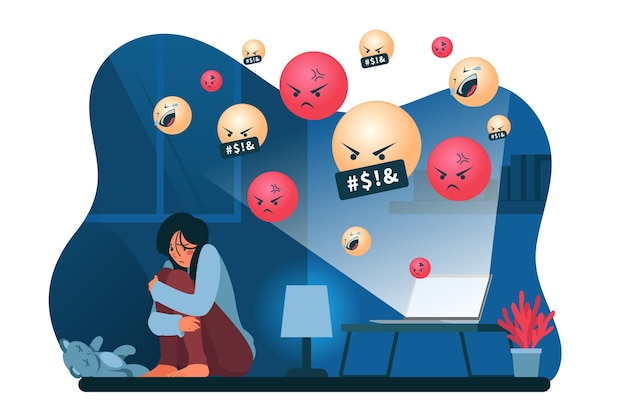Facts about cyberbullying

Cyberbullying can happen to anyone, regardless of age or gender.
The effects of cyberbullying can be devastating and long-lasting.
Cyberbullies often hide behind the anonymity of the internet.
Social media platforms are common breeding grounds for cyberbullying.
It is important for parents to be aware of their children’s online activities to prevent cyberbullying.
Cyberbullying can lead to depression, anxiety, and even suicide.
Victims of cyberbullying often experience a loss of self-esteem and confidence.
Cyberbullies thrive on the reactions and attention they receive from their victims.
Cyberbullying can occur 24/7, causing victims to feel constantly threatened and unsafe.
Some cyberbullies target their victims based on their race, religion, or sexual orientation.
Online harassment can have a profound impact on a person’s mental and emotional well-being.
Cyberbullying can affect a person’s academic performance and attendance.
Cyberbullying is not limited to text messages and social media; it can also occur through emails or online gaming platforms.
It is important for schools to educate students about the consequences of cyberbullying.
Laws and regulations regarding cyberbullying vary from country to country.
Cyberbullies often exhibit aggressive behavior offline as well.
Cyberbullying can occur among adults in the workplace, not just among teenagers.
Facts about cyberbullying part 2
Peer pressure and the desire for acceptance can sometimes lead individuals to participate in cyberbullying.
Cyberbullies often lack empathy and struggle with interpersonal relationships.
Reporting cyberbullying incidents to the appropriate authorities can help bring an end to the harassment.
Public figures and celebrities are not immune to cyberbullying.
Social media algorithms can sometimes amplify cyberbullying by promoting negative content.
Cyberbullying can have a detrimental effect on a person’s reputation and public image.
Building a strong support system can help victims of cyberbullying cope with the trauma.
Online platforms have a responsibility to create a safe environment for their users and prevent cyberbullying.
Cyberbullying can make individuals afraid to express themselves authentically online.
Teaching digital citizenship can help prevent cyberbullying by promoting responsible online behavior.
Cyberbullying can lead to a sense of isolation and loneliness in victims.
Standing up against cyberbullying is essential to create a safer online community.
Cyberbullying can affect a person’s physical health due to the stress and anxiety it causes.
It is important for friends and peers to support victims of cyberbullying and offer a listening ear.
Cyberbullying can violate a person’s privacy and personal boundaries.
Cyberbullying often involves spreading rumors, falsehoods, or sensitive personal information.
Parents should set clear guidelines and rules regarding internet and social media usage to prevent cyberbullying.
Encouraging empathy and kindness online can help reduce instances of cyberbullying.
Cyberbullies may have experienced trauma or bullying themselves, leading to their aggressive behavior.
Cyberbullying can impact a person’s ability to trust others, both online and offline.
Encouraging open communication with children about their online experiences can promote early intervention in cases of cyberbullying.
Cyberbullying can make it difficult for victims to form healthy relationships and trust others.
Victims of cyberbullying often blame themselves for the harassment they experience.
Cyberbullying can hinder a person’s emotional growth and development.
Online anonymity can embolden cyberbullies, allowing them to take on personas they would not adopt in real life.
Cyberbullying can have a detrimental impact on a person’s academic and career aspirations.
Cyberbullying prevention requires a collective effort from individuals, schools, parents, and online platforms.
Education and awareness campaigns about cyberbullying can help empower individuals to stand against it.

